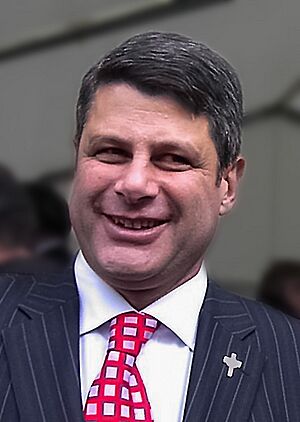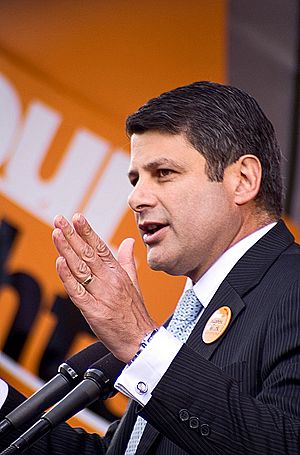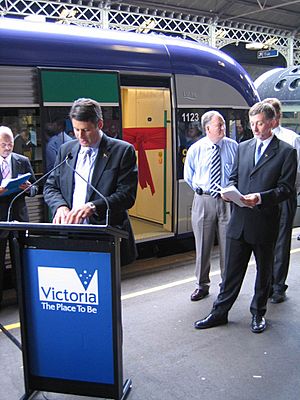Steve Bracks facts for kids
Quick facts for kids
Steve Bracks
|
|
|---|---|

Bracks in 2006
|
|
| 44th Premier of Victoria | |
| In office 20 October 1999 – 30 July 2007 |
|
| Monarch | Elizabeth II |
| Governor | James Gobbo John Landy David de Kretser |
| Deputy | John Thwaites |
| Preceded by | Jeff Kennett |
| Succeeded by | John Brumby |
| Leader of the Labor Party in Victoria | |
| In office 22 March 1999 – 30 July 2007 |
|
| Deputy | John Thwaites |
| Preceded by | John Brumby |
| Succeeded by | John Brumby |
| Leader of the Opposition in Victoria | |
| In office 22 March 1999 – 20 October 1999 |
|
| Premier | Jeff Kennett |
| Deputy | John Thwaites |
| Preceded by | John Brumby |
| Succeeded by | Jeff Kennett |
| Minister for Multicultural Affairs | |
| In office 20 October 1999 – 30 July 2007 |
|
| Premier | Himself |
| Preceded by | Jeff Kennett |
| Succeeded by | John Brumby |
| Minister for Veterans' Affairs | |
| In office 5 December 2002 – 30 July 2007 |
|
| Premier | Himself |
| Preceded by | New position |
| Succeeded by | John Brumby |
| Treasurer of Victoria | |
| In office 20 October 1999 – 22 May 2000 |
|
| Premier | Himself |
| Preceded by | Denis Napthine |
| Succeeded by | John Brumby |
| Member of the Victorian Legislative Assembly for Williamstown | |
| In office 13 August 1994 – 6 August 2007 |
|
| Preceded by | Joan Kirner |
| Succeeded by | Wade Noonan |
| Personal details | |
| Born |
Stephen Phillip Bracks
15 October 1954 Ballarat, Victoria, Australia |
| Political party | Labor |
| Spouse | Terry Horsfall |
| Children | 3, including Nick Bracks |
| Alma mater | University of Ballarat |
| Profession | Teacher |
| Signature |  |
Stephen Phillip Bracks (born 15 October 1954) is an Australian former politician. He was the 44th Premier of Victoria from 1999 to 2007. A Premier is like the leader of a state government. He was a member of the Labor Party.
Bracks became the leader of the Labor Party in Victoria in 1999. He led his party to win the state election that year. They defeated the government led by Jeff Kennett. Labor won again in 2002 with a big victory. They also won a third term in 2006.
In 2007, Bracks decided to retire from politics. John Brumby, who was the Treasurer, became the new Labor leader and Premier. Steve Bracks is one of the longest-serving Labor Premiers in Victoria's history.
Since 2021, Bracks has been the 6th Chancellor of Victoria University. This is a very important role at the university.
Contents
Early Life and Education
Steve Bracks was born in Ballarat, a city in Victoria, Australia. His family owned a fashion business there. His family has Lebanese roots; his grandfather came to Australia from Lebanon in the 1890s.
Bracks went to St Patrick's College in Ballarat. He also studied at the Ballarat College of Advanced Education. He earned degrees in business and education. He became a big fan of Australian rules football and supported the Geelong Football Club.
Before Becoming a Politician
From 1976 to 1981, Bracks worked as a commerce teacher at Sacred Heart College in Ballarat. In the 1980s, he worked for the local government in Ballarat. He also became the executive director of the Ballarat Education Centre.
During this time, he tried twice to win a seat in the Victorian Legislative Assembly for the Labor Party. In 1989, Bracks started working for the Victorian state government. He advised two Premiers, John Cain Jr. and Joan Kirner. This experience taught him a lot about how governments manage money.
After the Labor government lost the election in 1992, Bracks worked for the Victorian Printing Industry Training Board. In 1994, Joan Kirner left parliament. Bracks was then elected to represent the area of Williamstown in Melbourne. He lived there with his wife, Terry, and their three children.
State Politics
Starting in Parliament
When Bracks first entered parliament, he quickly became part of Labor's main team. He was a "Shadow Minister" for employment and tourism. This means he was responsible for these areas for the opposition party.
In 1996, he became the "Shadow Treasurer." This role involves looking at the government's money plans. In March 1999, he was chosen as the "Opposition Leader." This made him the main person leading the Labor Party against the government.
First Term as Premier (1999-2002)
Most people thought Bracks had no chance of winning the September 1999 election. The Premier at the time, Jeff Kennett, was very popular. However, Bracks and his team campaigned hard in regional areas. They said Kennett's government was ignoring these communities.
Many voters in regional areas then decided to support Labor. On election night, Labor won more seats than expected. The election ended with no single party having enough seats to form a government on its own. This is called a hung parliament.
A special election was held for one seat, which Labor won. This meant Labor, with the help of three independent politicians, could form a government. Bracks became Premier on 20 October 1999. He was the first Catholic Labor Premier of Victoria since 1932.
His team included John Brumby as Treasurer and John Thwaites as Deputy Premier. They were seen as key to the government's success.
One of the government's promises was to improve train services to regional areas. They started the Regional Fast Rail project in 2000. This project aimed to make train journeys between Melbourne and cities like Ballarat, Bendigo, and Geelong faster.
Second Term as Premier (2002-2006)
Labor won the 2002 election by a huge amount. They won 62 out of 88 seats in the Legislative Assembly. This was one of Labor's biggest wins ever in Victoria. They also won a majority in the Legislative Council for the first time.
With majorities in both houses, Bracks's government had more power to make changes. In 2002, Bracks worked with the Premier of New South Wales, Bob Carr, to open the Mowamba aqueduct. This project helped divert water to the Snowy and Murray rivers.
In 2003, Bracks made a decision about the proposed Scoresby Freeway. He announced it would be a toll road, meaning drivers would have to pay to use it. This was different from what was promised before the election. This decision caused some debate.
In 2005, Bracks's government decided to ban cattle grazing in Victoria's National Parks. This decision was made to protect the environment. It followed studies that showed cattle were damaging the high country.
One of Bracks's proudest achievements was changing how the state's upper house was elected. They introduced a system called proportional representation. This system gives smaller parties a better chance to win seats.
Victoria hosted the 2006 Commonwealth Games, which was seen as a big success. This event helped boost the government's image.
Third Term as Premier (2006-2007)
In the 2006 state election, Bracks won his third term as Premier. This was only the second time the Victorian Labor Party had won three terms in office. His government continued to focus on important issues like infrastructure.
Resignation
On 27 July 2007, Bracks announced he was resigning as Premier. He said he wanted to spend more time with his family. He officially stepped down on 30 July 2007.
His deputy, John Thwaites, also resigned on the same day. John Brumby, who was the Treasurer, became the new Premier.
After Politics
After leaving politics, Bracks took on new roles. In August 2007, he went to East Timor to advise their newly elected Prime Minister, Xanana Gusmão. He helped them set up their government.
Bracks also joined the advisory boards of several companies, including KPMG and the NAB. In 2008, the Australian government asked him to lead an inquiry into the future of the Australian car industry.
In 2010, Bracks received a high honor called the Companion of the Order of Australia. This was for his great service to the community and the Victorian Parliament. He also received an honorary law degree from Deakin University.
In May 2013, Bracks was appointed as the Australian consul-general in New York. This is a diplomatic role representing Australia in the United States. However, this appointment was later changed by the new government.
In March 2019, it was announced that Bracks would become the 6th Chancellor of Victoria University starting in 2021. In June 2020, he was also appointed to help review the Victorian branch of the Labor Party.
 | DeHart Hubbard |
 | Wilma Rudolph |
 | Jesse Owens |
 | Jackie Joyner-Kersee |
 | Major Taylor |



